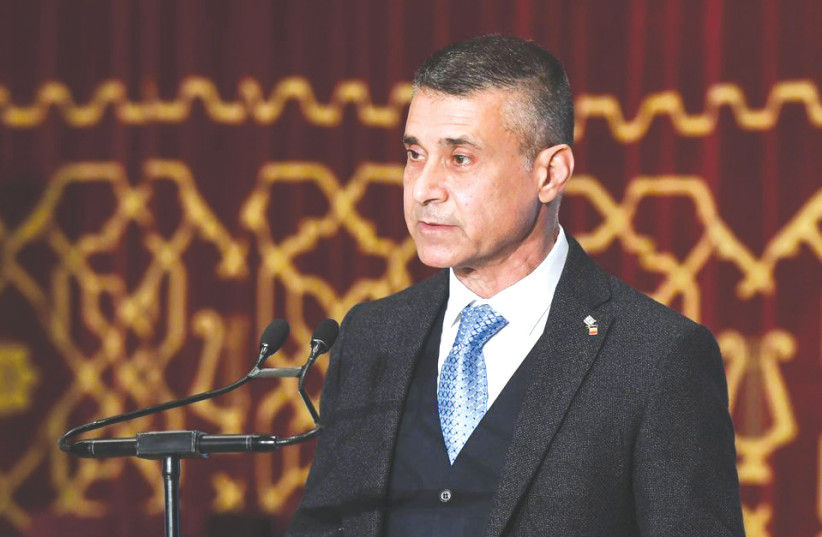Likud MKs were instructed to have nothing to do with the Romanian AUR Party on grounds that it is antisemitic.
Likud foreign affairs director and spokesman Eli Hazan wrote to all of the party’s lawmakers on Saturday night, “AUR was elected to the parliament and is growing in popularity, in part because it is anti-establishment and opposes vaccines and restrictions.
“This party is antisemitic,” he warned.
Hazan sent the message after an AUR leader proudly claimed in media interviews in Romania that he plans to meet with Likud representatives in April. The Likud official said he does not know of any party MKs who actually agreed to meet with AUR.
“I implore you: Don’t do it,” Hazan wrote. “It is bad for the State of Israel, bad for Likud, and the Jewish community in Romania is very concerned about this announcement.”

Hazan referred to recent remarks by the AUR Party opposing the amount of Holocaust education in Romania. The Holocaust is a “minor topic,” AUR stated earlier this month. Teaching it as a separate subject in schools, they say, is an “ideological experiment” and part of a “systematic action to undermine the quality of education in Romania.”
AUR also voted in the Romanian Parliament against a condemnation of antisemitism, and its cochairman Claudiu Târziu attended conferences of the local fascist movement.
AUR representatives attempted to contact Hazan after they were elected the fourth-largest party in the parliament in Bucharest in 2020.
Hazan said he asked the party to reject Ion Antonescu, the Romanian dictator who joined the Axis powers in World War II, and the AUR did not do so. Antonescu’s policies were responsible for the deaths of 280,000-380,000 Jews in Romania and Ukraine, according to the Wiesel Commission.
“Unlike other parties that I was open to because they really want to change. This party is catastrophic,” Hazan said on Saturday.
Likud has faced criticism in the past for building contacts with European political parties founded by former Nazis, such as the Freedom Party in Austria and the Sweden Democrats.
Hazan explained that he was willing to have a relationship with the Austrian Freedom Party when it was under the leadership of Heinz-Christian Strache, who the Likud spokesman said tried to push antisemitic elements out of the party. Since Strache resigned, amid a corruption scandal, Likud has not been in contact with the party.
As for the Sweden Democrats, Hazan said, “In the past, they were a self-declared antisemitic party. Today, they are fundamentally different. There are antisemites there, but the party denounces them. That is the difference.”
At the same time, Likud has not hesitated to partner with foreign political parties the local Jewish communities have condemned, such as the Fidesz Party in Hungary.
Earlier this month, Israeli Ambassador to Romania David Saranga criticized AUR for calling for less Holocaust education, calling them “insulting.”
“I have always argued that the fair and objective knowledge over the horrors that took place during the Holocaust in Romania is necessary in order to avoid repeating such tragedies,” Saranga tweeted. “The young generation must thoroughly learn about this dark page in the history of humankind in order to understand that antisemitism, xenophobia and intolerance have no place in today’s society, and that they clash with the democratic and European values assimilated by Romania.”
The ambassador praised a law approved by the Romanian Parliament in November and supported by President Klaus Iohannis that would make Holocaust study compulsory.
“Extremist reactions remind us that ideologies and radical manifestations are present even today,” he tweeted. “I am sure Romanian people will choose historical truth over antisemitic speech.”
Romanian Special Representative for Memory, Combating Xenophobia and Antisemitism Alexandru Muraru said at the time, in response to the AUR statement, “Romania has the duty to defend the memory of the victims of the Holocaust [and] we have the tools, the institutions and the political will to carry out this mission.
“A large-scale tragedy such as the Holocaust cannot be a ‘minor issue’ given that it led to the destruction of a significant percentage of the Jewish community in Romania,” Muraru said.
Romanian Ambassador to Israel Radu Ioanid is the leading researcher of the Holocaust in Romania, and was one of the founding historians of the US Holocaust Memorial Museum.
In an interview with The Jerusalem Post last year, he praised the Romanian government for following the recommendations of a report drafted by Elie Wiesel to improve Holocaust education and fight Holocaust denial.
